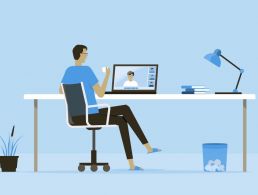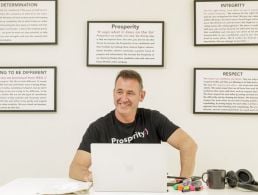For International Women’s Day 2022, these women told us about their companies’ efforts to boost gender diversity in STEM and what more should be done.
International Women’s Day is far from the only day in the year to talk about women working in STEM. However, as Mastercard’s Sonya Geelon points out, it is as good a time as any to seize the opportunity to highlight the things women have achieved in STEM to inspire the next generation.
The country manager for Ireland at Mastercard is a “firm believer” in the motto ‘if you can see it, you can be it’. She thinks nurturing talent is key to ensuring the progress made to date is engrained in the workers of the future.
“For those who are choosing a STEM career, we need to be better at exposing them to the world of possibilities, providing them with practical insights and shining a light on the breadth of roles available.”
To that end, Mastercard set up Girls4Tech, an employee volunteer and education programme built around global science and maths standards. Participating students learn about payment technology algorithms, encryption, fraud detection and data analysis. So far, more than 1.5m girls aged between eight and 16 in 44 different countries have participated and the company’s goal is to reach 5m girls by 2025.
Nadia Alramli, senior director of engineering in HubSpot’s products division, agrees that the world needs to start showing young girls the possibilities open to them so they know they can choose a career in STEM.
“Despite seeing a lot of programmes and initiatives focused on supporting women who are already in STEM, barely any tackle the problem of not having enough women choosing STEM as a career path in the first place. We need to focus on the root of the issue and provide more support and guidance to young women when introducing them to STEM during secondary education,” she says.
Siobhan Ryan, enterprise sales executive at UiPath in Ireland, knows this is true on a personal level. Having worked in tech since 1994, she recently encouraged her daughter to complete a UiPath Academy certification online during the pandemic.
According to Ryan, her secondary school-age daughter “wasn’t previously very interested in technology”.
“However, the certification taught her about robotic process automation (RPA) and she managed to build her own bot,” Ryan says. She was fascinated by both how quickly her daughter picked up the coding aspect of RPA and how she was “more inspired by the changing nature of work” and how technologies like RPA are involved in shaping the future.
‘We need to focus on the root of the issue and provide more support and guidance to young women when introducing them to STEM during secondary education’
– NADIA ALRAMLI
“We need diverse voices more than ever because the stakes are higher as we mature into the next generation of technology – and ‘why’ questions will be at the core of this,” Ryan adds. “Instead of fighting to attract women away from the social sciences, we need to embrace the social sciences and explicitly incorporate them into technology education and careers.”
HubSpot’s Alramli agrees with Ryan’s point about getting secondary school students more involved in STEM, and notes that getting inspiration from family members may not be enough to “move the needle” alone.
Paula Neary, a managing director and STEM sponsor at Accenture Ireland, cited recent research from company that found 35pc of women never had a role model that helped them growing up.
Like many others, she thinks we should start showing girls from an early age what women have achieved in STEM so they can be inspired. Accenture recently set up its Women on Walls STEM Hub in collaboration with Dublin City University and Scoilnet, the Department of Education’s portal for teachers and schools.
“The hub is a collection of resources for primary and post-primary teachers, parents and students. It’s centred around eight inspirational female STEM leaders including immunologist Dr Lydia Lynch, zoologist Prof Emma Teeling and Sheila Tinney, the first Irish woman to receive a PhD in the field of mathematics,” Neary says.
Deirdre Sarsfield, VP for corporate marketing and managing director at Kemp Ireland, also believes more needs to be done to encourage young women to get into STEM careers after graduation. Like the other women who spoke to us, she agrees that showcasing role models is a good way of going about this.
“Seeing more and more role models in the public eye and speaking at events like Future Human continues to shine more light on this career path for the next generation,” she says, mentioning Silicon Republic’s tech event.
Kemp was acquired by software firm Progress last year and Sarsfield says the company offers scholarships around the world as part of its Women in STEM Scholarship series.
‘I’ve been fortunate to see two consecutive female site leads in the last few years, something I would have never been able to even imagine at the start of my career’
– VALERIE FITZGERALD
Valerie Fitzgerald, associate director and development lab operations lead for BioNX at MSD, echoes the importance of the ‘if you can see it, you can be it’ motto on representation. It is a key priority for both MSD and her personally, she says, pointing out that having role models can help young women combat imposter syndrome.
“I’ve been fortunate to see two consecutive female site leads in the last few years, something I would have never been able to even imagine at the start of my career,” Fitzgerald says of MSD’s Co Meath site.
MSD also has a Women’s Network that helps women build “thriving, rewarding and impactful” careers where they can “feel a sense of belonging”.
Fidelity Investments has a similar support network for women, with its Women’s Leadership Group and Women In Tech special interest group launching two new programmes to help women progress in STEM careers.
According to Fiona Brett, VP of technology management at Fidelity Ireland, the first is a programme that aims to assist women who want to progress into new opportunities by “cultivating their strengths, building their confidence and developing their communication style and presence”.
The second programme is aimed at women experiencing menopause. “Our mission is to empower women within Fidelity to optimise their health and vitality during their menopausal years so they can continue to thrive and live their best life while experiencing symptoms of menopause,” Brett says.
‘It’s important to always be on your game and do all you can to pull other women up with you’
– HELEN KELISKY
With a mix of specially designed industry outreach and education programmes and more young girls being exposed to inspirational women in STEM, there is hope that the sector will be able to overcome its diversity problem in time.
Aon’s Liz Henderson, who serves as co-head of Americas property analytics, says that when she started her career in 2003 she was only the third woman on her team. However, she has since seen a gradual increase in the number of women colleagues since then.
“Since I graduated from college with a degree in mathematics, I was used to often being the only woman in a room. Today, I see more and more women join analytics careers in insurance. Especially encouraging are the number of female early-career applicants with degrees in maths, engineering, data science and computer programming,” she says.
While there is still some way to go, women in senior STEM positions are “becoming less of an exception” says Helen Kelisky, managing director for Google Cloud in the UK and Ireland.
“During my career I’ve found that being a female, and at times the exception in a circle of other tech leaders, it’s important to always be on your game and do all you can to pull other women up with you,” she adds.
“I’ve been privileged to work with hugely impressive female leaders throughout my career, to watch them fill boardrooms with diverse voices and new ideas, and inspire the next generation.”
Don’t miss out on the knowledge you need to succeed. Sign up for the Daily Brief, Silicon Republic’s digest of need-to-know sci-tech news.




